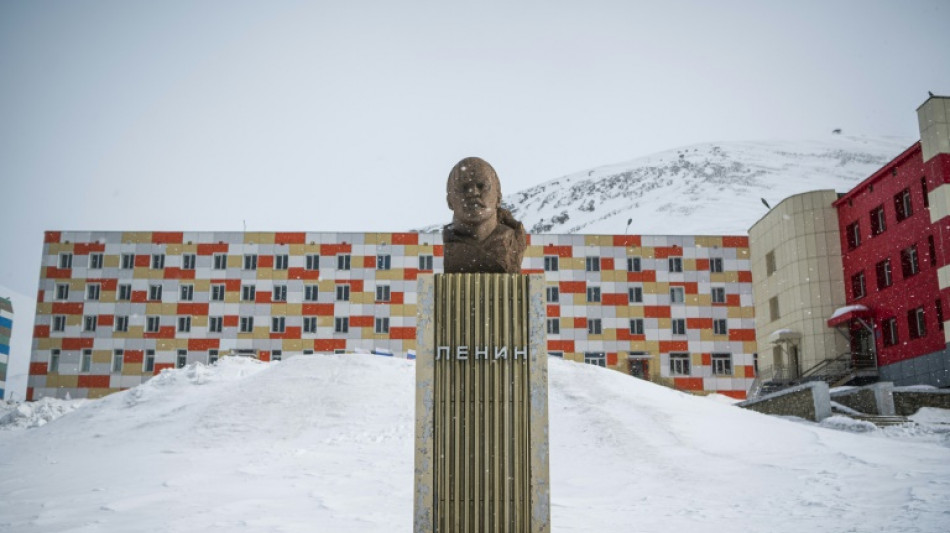
-
 Epstein survivors say abusers 'remain hidden' after latest files release
Epstein survivors say abusers 'remain hidden' after latest files release
-
'Full respect' for Djokovic but Nadal tips Alcaraz for Melbourne title

-
 Wollaston goes back-to-back in the Cadel Evans road race
Wollaston goes back-to-back in the Cadel Evans road race
-
Women in ties return as feminism faces pushback

-
 Ship ahoy! Prague's homeless find safe haven on river boat
Ship ahoy! Prague's homeless find safe haven on river boat
-
Britain's Starmer ends China trip aimed at reset despite Trump warning

-
 Carlos Alcaraz: rare tennis talent with shades of Federer
Carlos Alcaraz: rare tennis talent with shades of Federer
-
Novak Djokovic: divisive tennis great on brink of history

-
 History beckons for Djokovic and Alcaraz in Australian Open final
History beckons for Djokovic and Alcaraz in Australian Open final
-
Harrison, Skupski win Australian Open men's doubles title

-
 Epstein offered ex-prince Andrew meeting with Russian woman: files
Epstein offered ex-prince Andrew meeting with Russian woman: files
-
Jokic scores 31 to propel Nuggets over Clippers in injury return

-
 Montreal studio rises from dark basement office to 'Stranger Things'
Montreal studio rises from dark basement office to 'Stranger Things'
-
US government shuts down but quick resolution expected

-
 Mertens and Zhang win Australian Open women's doubles title
Mertens and Zhang win Australian Open women's doubles title
-
Venezuelan interim president announces mass amnesty push

-
 China factory activity loses steam in January
China factory activity loses steam in January
-
Melania Trump's atypical, divisive doc opens in theatres

-
 Bad Bunny set for historic one-two punch at Grammys, Super Bowl
Bad Bunny set for historic one-two punch at Grammys, Super Bowl
-
Five things to watch for on Grammys night Sunday

-
 Venezuelan interim president proposes mass amnesty law
Venezuelan interim president proposes mass amnesty law
-
Rose stretches lead at Torrey Pines as Koepka makes cut

-
 Online foes Trump, Petro set for White House face-to-face
Online foes Trump, Petro set for White House face-to-face
-
Seattle Seahawks deny plans for post-Super Bowl sale

-
 US Senate passes deal expected to shorten shutdown
US Senate passes deal expected to shorten shutdown
-
'Misrepresent reality': AI-altered shooting image surfaces in US Senate

-
 Thousands rally in Minneapolis as immigration anger boils
Thousands rally in Minneapolis as immigration anger boils
-
US judge blocks death penalty for alleged health CEO killer Mangione

-
 Lens win to reclaim top spot in Ligue 1 from PSG
Lens win to reclaim top spot in Ligue 1 from PSG
-
Gold, silver prices tumble as investors soothed by Trump Fed pick

-
 Ko, Woad share lead at LPGA season opener
Ko, Woad share lead at LPGA season opener
-
US Senate votes on funding deal - but shutdown still imminent

-
 US charges prominent journalist after Minneapolis protest coverage
US charges prominent journalist after Minneapolis protest coverage
-
Trump expects Iran to seek deal to avoid US strikes

-
 Guterres warns UN risks 'imminent financial collapse'
Guterres warns UN risks 'imminent financial collapse'
-
NASA delays Moon mission over frigid weather

-
 First competitors settle into Milan's Olympic village
First competitors settle into Milan's Olympic village
-
Fela Kuti: first African to get Grammys Lifetime Achievement Award

-
 'Schitt's Creek' star Catherine O'Hara dead at 71
'Schitt's Creek' star Catherine O'Hara dead at 71
-
Curran hat-trick seals 11 run DLS win for England over Sri Lanka

-
 Cubans queue for fuel as Trump issues energy ultimatum
Cubans queue for fuel as Trump issues energy ultimatum
-
France rescues over 6,000 UK-bound Channel migrants in 2025

-
 Surprise appointment Riera named Frankfurt coach
Surprise appointment Riera named Frankfurt coach
-
Maersk to take over Panama Canal port operations from HK firm

-
 US arrests prominent journalist after Minneapolis protest coverage
US arrests prominent journalist after Minneapolis protest coverage
-
Analysts say Kevin Warsh a safe choice for US Fed chair

-
 Trump predicts Iran will seek deal to avoid US strikes
Trump predicts Iran will seek deal to avoid US strikes
-
US oil giants say it's early days on potential Venezuela boom

-
 Fela Kuti to be first African to get Grammys Lifetime Achievement Award
Fela Kuti to be first African to get Grammys Lifetime Achievement Award
-
Trump says Iran wants deal, US 'armada' larger than in Venezuela raid


Russia's isolation takes toll on Arctic climate science
Glaciologist Andrew Hodson used to collaborate with his Russian colleagues in the Svalbard archipelago in the Arctic, but snowmobile excursions to see them have come to a halt since the war in Ukraine.
"We used to work with Russian permafrost scientists and hydrologists in the Barentsburg region. This doesn't happen now," the British scientist told AFP.
"We're sad that we can't use this basis for collaboration, but we're not at all happy with the actions of the Russian government, obviously," he said at his office at Longyearbyen University in the archipelago's capital.
Although a part of Norway, the islands have long had a strong Russian presence. But the frequently-cited diplomatic mantra of cohabitation there -- "High North, low tensions" -- no longer applies.
In the Arctic, as in the rest of the world, Western and Russian researchers have cut almost all ties since the start of the war in Ukraine.
Moscow's February 2022 invasion was the final nail in the coffin of their cooperation, already in decline in recent decades amid President Vladimir Putin's more aggressive policies.
The deep freeze has significantly affected scientific research in a region warming around four times faster than the planet as a whole, and which is therefore crucial to climate studies -- and where Russia plays a major role due to its vast size.
- Missing data -
"It's damaging because Russia is more than half of the Arctic," said Rolf Rodven, executive secretary of the Arctic Monitoring and Assessment Programme (AMAP). ]
The exchange of data from Russia has now completely dried up.
"We do not know what's happening on the ground there and of course, what's happening there will also affect the European, US and Canadian part of the Arctic," he said.
This deprives scientists of crucial information about permafrost -- present predominantly in Russia and a ticking time bomb for the climate of the entire planet -- and recent wildfires, which are believed to have been as devastating as those in North America.
Some data can be obtained through international databases such as the World Meteorological Organization or through satellite observations, but those are incomplete.
"We know that there will be more uncertainty in our estimates and as a consequence also more uncertainties in projections for the future," Rodven said.
Studies written by AMAP -- one of the Arctic Council's six working groups -- are all the more important since they are used in reports by the UN's IPCC climate panel.
The Arctic Council is a regional forum long held up as a model of cooperation, but now stands divided between the West (Canada, Denmark, Finland, Iceland, Norway, Sweden and the United States) and Russia.
A number of projects have been suspended and some studies have been delayed.
Not only have relations with Russian research institutes -- almost all state-run bodies -- been halted, but even the few independent researchers are reluctant to cooperate for fear of being accused of treason or espionage.
Already in 2019, Russian scientists expressed concern about restrictions imposed on their contacts with foreign colleagues, raising fears of a return to conditions that existed during the Soviet era.
- Brain drain -
Russia's research community has been plagued by a "brain drain" -- which began even before Moscow's invasion of Ukraine -- and funding that has been slashed in order to pay for the war effort.
"It's a double whammy," said Salve Dahle, a marine biologist at Norway's independent Akvaplan-niva institute.
"Not only do we no longer benefit from the exchange of data, but the collection of data in Russia itself is also cut back."
Dahle, who used to frequently work on projects in Russia, said his primary concern was for Siberia's main rivers, the Arctic Ocean's biggest source of freshwater.
Without being present in the field, it's impossible to measure the effects on the rivers of oil and gas drilling, industrial activities and mining.
"Everything that can be dissolved in water or be captured in ice is transported into the transpolar drift stream (an ocean current that flows from east to west) and flows out between Greenland and Svalbard," he said.
In Longyearbyen, British glaciologist Andrew Hodson is trying to be pragmatic.
"There's much to be gained from working with the expertise there," he said of his Russian research colleagues.
"But I won't pretend that it was ever easy... So no, I'm not that sorry."
R.Kloeti--VB




